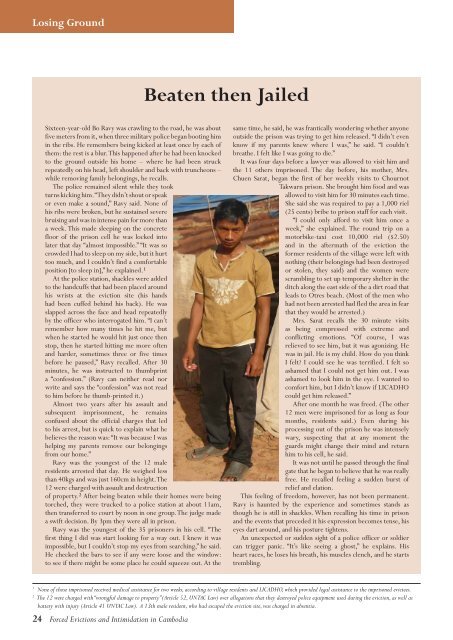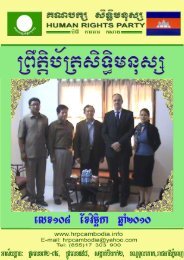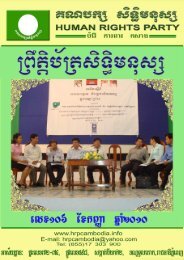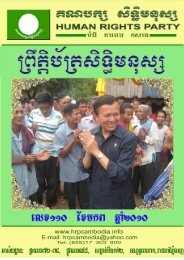Losing Ground - Human Rights Party.
Losing Ground - Human Rights Party.
Losing Ground - Human Rights Party.
You also want an ePaper? Increase the reach of your titles
YUMPU automatically turns print PDFs into web optimized ePapers that Google loves.
<strong>Losing</strong> <strong>Ground</strong><br />
Beaten then Jailed<br />
Sixteen-year-old Bo Ravy was crawling to the road, he was about<br />
five meters from it, when three military police began booting him<br />
in the ribs. He remembers being kicked at least once by each of<br />
them: the rest is a blur. This happened after he had been knocked<br />
to the ground outside his home – where he had been struck<br />
repeatedly on his head, left shoulder and back with truncheons –<br />
while removing family belongings, he recalls.<br />
The police remained silent while they took<br />
turns kicking him. “They didn’t shout or speak<br />
or even make a sound,” Ravy said. None of<br />
his ribs were broken, but he sustained severe<br />
bruising and was in intense pain for more than<br />
a week. This made sleeping on the concrete<br />
floor of the prison cell he was locked into<br />
later that day “almost impossible.” “It was so<br />
crowded I had to sleep on my side, but it hurt<br />
too much, and I couldn’t find a comfortable<br />
position [to sleep in],” he explained.1<br />
At the police station, shackles were added<br />
to the handcuffs that had been placed around<br />
his wrists at the eviction site (his hands<br />
had been cuffed behind his back). He was<br />
slapped across the face and head repeatedly<br />
by the officer who interrogated him. “I can’t<br />
remember how many times he hit me, but<br />
when he started he would hit just once then<br />
stop, then he started hitting me more often<br />
and harder, sometimes three or five times<br />
before he paused,” Ravy recalled. After 30<br />
minutes, he was instructed to thumbprint<br />
a “confession.” (Ravy can neither read nor<br />
write and says the “confession” was not read<br />
to him before he thumb-printed it.)<br />
Almost two years after his assault and<br />
subsequent imprisonment, he remains<br />
confused about the official charges that led<br />
to his arrest, but is quick to explain what he<br />
believes the reason was: “It was because I was<br />
helping my parents remove our belongings<br />
from our home.”<br />
Ravy was the youngest of the 12 male<br />
residents arrested that day. He weighed less<br />
than 40kgs and was just 160cm in height. The<br />
12 were charged with assault and destruction<br />
of property.2 After being beaten while their homes were being<br />
torched, they were trucked to a police station at about 11am,<br />
then transferred to court by noon in one group. The judge made<br />
a swift decision. By 3pm they were all in prison.<br />
Ravy was the youngest of the 35 prisoners in his cell. “The<br />
first thing I did was start looking for a way out. I knew it was<br />
impossible, but I couldn’t stop my eyes from searching,” he said.<br />
He checked the bars to see if any were loose and the window:<br />
to see if there might be some place he could squeeze out. At the<br />
same time, he said, he was frantically wondering whether anyone<br />
outside the prison was trying to get him released. “I didn’t even<br />
know if my parents knew where I was,” he said. “I couldn’t<br />
breathe. I felt like I was going to die.”<br />
It was four days before a lawyer was allowed to visit him and<br />
the 11 others imprisoned. The day before, his mother, Mrs.<br />
Chuen Sarat, began the first of her weekly visits to Chournot<br />
Takwarn prison. She brought him food and was<br />
allowed to visit him for 30 minutes each time.<br />
She said she was required to pay a 1,000 riel<br />
(25 cents) bribe to prison staff for each visit.<br />
“I could only afford to visit him once a<br />
week,” she explained. The round trip on a<br />
motorbike-taxi cost 10,000 riel ($2.50)<br />
and in the aftermath of the eviction the<br />
former residents of the village were left with<br />
nothing (their belongings had been destroyed<br />
or stolen, they said) and the women were<br />
scrambling to set up temporary shelter in the<br />
ditch along the east side of the a dirt road that<br />
leads to Otres beach. (Most of the men who<br />
had not been arrested had fled the area in fear<br />
that they would be arrested.)<br />
Mrs. Sarat recalls the 30 minute visits<br />
as being compressed with extreme and<br />
conflicting emotions. “Of course, I was<br />
relieved to see him, but it was agonizing. He<br />
was in jail. He is my child. How do you think<br />
I felt? I could see he was terrified. I felt so<br />
ashamed that I could not get him out. I was<br />
ashamed to look him in the eye. I wanted to<br />
comfort him, but I didn’t know if LICADHO<br />
could get him released.”<br />
After one month he was freed. (The other<br />
12 men were imprisoned for as long as four<br />
months, residents said.) Even during his<br />
processing out of the prison he was intensely<br />
wary, suspecting that at any moment the<br />
guards might change their mind and return<br />
him to his cell, he said.<br />
It was not until he passed through the final<br />
gate that he began to believe that he was really<br />
free. He recalled feeling a sudden burst of<br />
relief and elation.<br />
This feeling of freedom, however, has not been permanent.<br />
Ravy is haunted by the experience and sometimes stands as<br />
though he is still in shackles. When recalling his time in prison<br />
and the events that preceded it his expression becomes tense, his<br />
eyes dart around, and his posture tightens.<br />
An unexpected or sudden sight of a police officer or soldier<br />
can trigger panic. “It’s like seeing a ghost,” he explains. His<br />
heart races, he loses his breath, his muscles clench, and he starts<br />
trembling.<br />
1<br />
None of those imprisoned received medical assistance for two weeks, according to village residents and LICADHO, which provided legal assistance to the imprisoned evictees.<br />
2<br />
The 12 were charged with “wrongful damage to property” (Article 52, UNTAC Law) over allegations that they destroyed police equipment used during the eviction, as well as<br />
battery with injury (Article 41 UNTAC Law). A 13th male resident, who had escaped the eviction site, was charged in absentia.<br />
24 Forced Evictions and Intimidation in Cambodia






